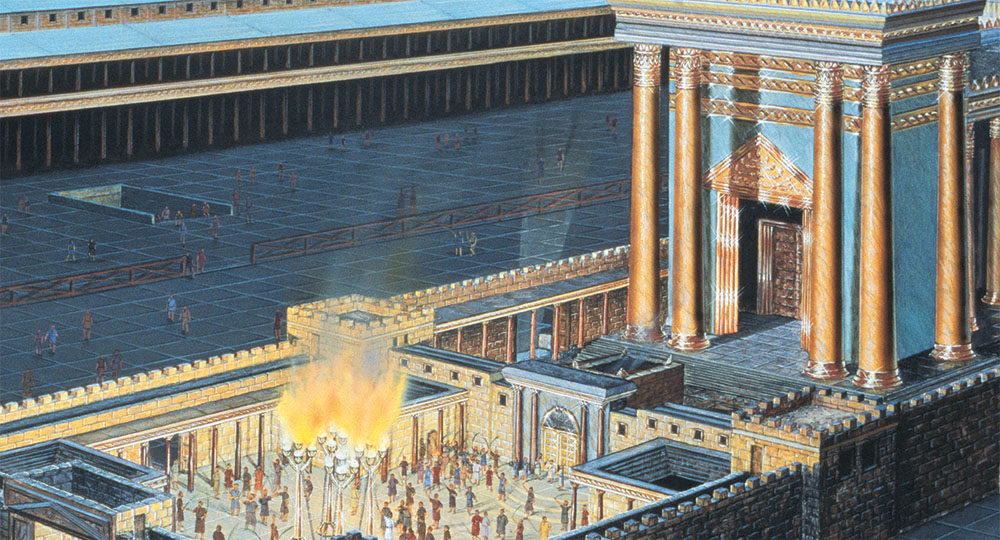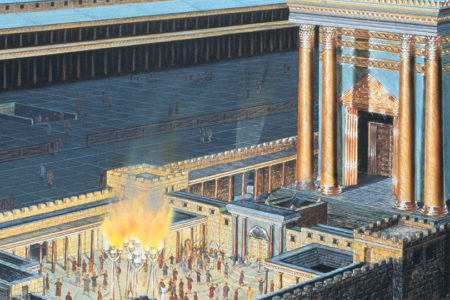Herod the Great?
History has bestowed on him the descriptive title, “the Great.” The primary Jewish chronicler of his period, Josephus, was the first to use the actual phrase “Herod the Great” in his Antiquities of the Jews. He used the phrase to distinguish Herod from his sons and grandsons of the same name. In other words, he used the title in the sense of “the Greater” or “the Older.” Whatever the original reason, the name has stuck on the one who ruled as the “king of the Jews” from 37 to 4 B.C.
Although Herod died soon after Jesus’ birth, his shadow continued to loom over the New Testament through his huge building projects and his descendants, who continued to rule over the Jewish people in Israel throughout the first century A.D. We could question whether Herod deserved to have “the Great” added to his name. As we shall see, his personal and family life was such that he deserved more the title of “the Terrible.” On the other hand, he certainly left a “great” mark on history and well deserves the three books it took Josephus to describe his life and exploits (Antiquities, Books 15–17).
Herod’s Background
Herod was not born of direct Israelite ancestry. Josephus calls him an “Idumean,” the Roman term for the descendants of the Old Testament Edomites, who dwelt in the mountainous region below the Dead Sea. Around 128 B.C., John Hyrcanus, a zealous Hasmonean Jewish king, conquered the Idumeans and forcibly converted them to Judaism. Herod’s forebears appear to have been from those forced converts.
Josephus once called Herod a “half-Jew” (Antiquities, xiv.15.2), indicating not only his ancestry but possibly his half-hearted identification with the Jewish people. One church father also mentioned that Herod’s father was from Ashkelon in Philistia and had been carried off to Idumea, where he had grown up as one of them. Therefore, it seems that Herod had a mixed Philistine-Edomite background, while also identifying with Judaism as a descendant of forced converts.
His father, Antipater, had become a supporter of the new Roman rulers following their conquest of the Middle East in 63 B.C. As the appointed governor of Judea, Antipater maneuvered constantly to ensure a future for his two sons, Phasael and Herod. Antipater and his sons knew that currying the favor of the Romans was the only way to do this. As a young man, Herod built a reputation by apprehending some Jewish brigands in the Galilee. He flushed them out of the Arbel caves, where they were hiding, by lowering his men in baskets from the precipitous cliffs above the caves. It was the first of many wily maneuvers that characterized and endeared him to his Roman patrons.
Herod’s Rise to Power
After the violent deaths of his father and brother, Herod began his rise to kingship in 40 B.C. Antigonus, a descendant of the Hasmonean kings, was pressing for a restoration of that monarchy. Herod desperately needed assistance, so he scurried off to Rome, where he convinced Mark Antony and Octavius (the future Caesar Augustus) that supporting his cause was in the best interest of Rome. He was so convincing that the Senate of Rome confirmed on him the title “King of the Jews” in 40 B.C.
Three years later, Herod became king in fact as well as in name. Antigonus was executed by the Romans, and Herod began his bloody rule by executing 45 wealthy and prominent supporters of the Hasmoneans. Herod had finally arrived, but his new position was one that he constantly had to protect.
Herod’s Accomplishments
Herod indeed committed some monstrous acts. Because of those foul deeds, it is easy to overlook his truly amazing accomplishments. Although experiencing constant conflict within his own household, he maintained the outward peace of the nation remarkably well. His kingdom expanded to the boundaries it had known during the reign of Solomon, the days of its most distant frontiers.
It is in the area of his vast building projects that Herod left a legacy for all to behold that is evident even today. He took a sleepy little fishing port on the Mediterranean coast called Strato’s Tower and transformed it into a major port and mercantile center. He renamed it Caesarea after his patron, Emperor Caesar Augustus. He also adorned the Old Testament city of Samaria with magnificent architecture and called it Sebaste, the Greek word for Augustus.
It was in Jerusalem, however, that Herod left his most magnificent edifices. Next to the western Jaffa Gate of the city he constructed three huge towers that, because of their size and beauty, the Romans left standing when they destroyed the city in 70 A.D. In addition to the towers, he built his own magnificent palace, which rivaled those of kings and emperors worldwide. A theater, a hippodrome, an aqueduct, a fortress named for Mark Antony—the list goes on. The remarkable fact is that the huge stones in many of these structures are still visible today.
His largest and most significant Jerusalem building project was his reconstruction and vast embellishment of the old Zerubbabel Temple, which had stood for nearly 400 years. Herod spared no expense or effort in this project. He employed and trained priests for the construction of restricted areas, so that the daily service could continue unabated. He constructed a huge rectangular platform with a perimeter of nearly a half mile, supporting it with huge arches and vaults on the sloping sides of Mount Moriah. Pillars nearly 50 feet high adorned the porticoes, while limestone ashlars weighing nearly 50 tons comprised the 100-foot-high retaining walls. Archaeological labors to the south and west of these walls have revealed magnificent staircases, ritual purification baths, shops, and elaborate water systems. The debris from the 70 A.D. destruction and the “fill” of subsequent ages have been removed to unveil to visitors the utter wonder of this biggest and best of all Herod’s construction projects. Even the rabbis, who were not always Herod’s biggest fans, often remarked, “He who has not seen Herod’s Temple has never seen a beautiful building.”
Another type of Herodian construction reveals the darker side of the king’s character. Throughout Judea, Herod constructed huge fortresses—places not only for “getting away from the office” in Jerusalem, but retreats to which he could flee if rebellion to his autocratic rule ever erupted. Next to a magnificent winter palace in Jericho was the fortress of Cyrpos, named for his mother. On the other side of the Dead Sea, near his beloved hot springs, he built Machaerus, which later became a prison for the condemned John the Baptist. On the western shore of the Dead Sea, he surrounded a 1,200-foot-high rock with a wall boasting 72 towers, plus palaces, swimming pools, and huge storehouses—the virtually inaccessible stronghold called Masada. This remote fortress became the last stand of the Zealot warriors against the Romans in 73 A.D.
Herod’s “fortress mentality” is illustrated by the way he treated those who he thought had designs on his throne.
Herod’s Crimes
It is a strange irony that someone so personally powerful should be so insanely fearful of those around him. No one whom he suspected of treason was safe—not even his family members. Herod married ten wives. In 29 B.C., he executed Mariamme, the one he loved most, due to his insane jealousy. His guilty conscience over this act tormented him for the next 20 years. Soon after he came to the throne, Herod ordered the “accidental” drowning of the young high priest, Aristobulus III, because he feared that the Hasmonean teen’s potential might lead to an uprising. The harmless 80-year-old Hasmonean priest Hyrcanus II was also executed for the unjustifiable crime of treason.
The last years of Herod’s life were marked by further executions resulting from his extreme paranoia and the intrigues of his vast household. In 7 B.C., he strangled Alexander and Aristubulus, the twin sons of Mariamme, on trumped-up charges from their court rivals. Again and again he altered his will, alternately including and then excluding some of his many sons. As his illnesses increased and his mental state deteriorated, he executed his son, Antipater, a few days before his death, altering his will one final time. His patron Augustus remarked at that time, “It is safer to be Herod’s pig than Herod’s son.”
Knowing that there would be certain jubilation in the land at the news of his demise, Herod ordered that hundreds of Jewish leaders be imprisoned and executed immediately after he died. This was to ensure that there would be mourning after his death, rather than rejoicing. Mercifully, that last order was not carried out.
Herod’s Legacy
Herod the Great is mentioned directly in the New Testament only in the account of Jesus’ birth in Bethlehem, in conjunction with the visit of the wise men and his subsequent slaughter of the young children (Mt. 2:1–16). (The Herod of the later Gospel accounts was Herod Antipas, his son. The Herod in Acts 12 was Agrippa I, his grandson.) Josephus did not mention this heinous crime, causing some critics to question the reliability of the account. The event, however, fits perfectly in the context of Herod’s mental state and his insane fear that someone would take over his throne. “What Matthew briefly narrates appears to be entirely consistent with all that we know of Herod, especially in his last days” (Paul Barnett, Behind the Scenes of the New Testament, p. 25).
The question of the magi, “Where is he that is born King of the Jews?” (Mt. 2:2), comes alive when we recall that this is the exact title bestowed on Herod by the Roman Senate more than 30 years earlier. Herod had been made “king of the Jews” the magi were seeking one who had been born “King of the Jews.” No wonder Herod was eager to meet this “King.” He would then do to Him what he had done to his own sons.
Soon after the Messiah’s birth and Herod’s failure to eliminate Him, the sick and miserable old man finally expired. He was buried following a royal funeral procession in another of his fortresses, named after himself—the Herodium. This artificial, cone-shaped hill stands silently today just a few miles from Bethlehem. As a matter of fact, the soldiers who carried out the crime on the innocent children of that tiny town may have been dispatched from this fortress. Today the fortress is a shell—recovered by the archaeologists. Herod’s kingdom is no more and has no continuing influence. The kingdom of Israel’s Messiah, however, continues. The king by might is gone—the King by right lives forever!









1 thought on “Herod the Great?”